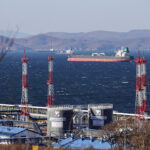Lukoil confirms plans to increase oil production in the West Qurna-2 oil field in Iraq
Lukoil (ticker: LKOH) President Vagit Alekperov visited Iraq to discuss further development in the West Qurna-2 field. Iraqi Prime Minister Haider al-Abadi and Minister of Oil Adel Abdul Mahdi both expressed appreciation in the continued work by the company in their country, according to a Lukoil press release.
Before his visit, Alekperov said that Lukoil was going to ask Iraq to increase the volume of oil compensation. Otherwise, the company would be forced to reduce the amount of investment it put into the project, reports Russian news agency TASS.
Al-Abadi confirmed that the authorities are willing to continue providing full support for joint projects. He also gave an account of what the Iraqi government did to contribute to the creation of favorable conditions for the activities of foreign companies in Iraq. Among other things, he said, the question of easing the visa restrictions for foreign investors was being examined.
“The company sticks to its plans to develop the business in Iraq on a long-term basis and to increase the production of oil,” said Alekperov after meeting with the Iraqi authorities. “We hope that the Iraqi side will take all possible steps in this difficult situation, in order to increase the transfer of our cost oil, with one purpose, so that we would be able to keep the pace of investments that already have been planned.”
It was reported previously that the Iraqi Oil Ministry invited foreign oil companies to negotiate the revision of the service contracts. It is impossible to fulfill the obligations on reimbursement to companies working in Iraq due to the significant drop in oil prices since last year, reports TASS.
Lukoil acquired the right to participate in the development of the field in December 2009 as part of a consortium with Norway’s Statoil (ticker: STO), which later withdrew from the project. The recoverable reserves at the field are estimated at 13 billion barrels with a current production of 380 MBOPD.
Iraq registered the second-highest volume growth rate in the world in 2014, trailing only the United States, despite clashes with the Islamic State in the northern part of the country. In December, Iraq’s central government and the Kurdish Regional Government reached a deal on oil exports and revenues, which could facilitate significant increases in production and exports from fields in the Iraqi Kurdish Region. Barring any major supply disruption, the EIA expects that Iraq will continue to be OPEC’S largest source of production growth over the next two years.
Important disclosures: The information provided herein is believed to be reliable; however, EnerCom, Inc. makes no representation or warranty as to its completeness or accuracy. EnerCom’s conclusions are based upon information gathered from sources deemed to be reliable. This note is not intended as an offer or solicitation for the purchase or sale of any security or financial instrument of any company mentioned in this note. This note was prepared for general circulation and does not provide investment recommendations specific to individual investors. All readers of the note must make their own investment decisions based upon their specific investment objectives and financial situation utilizing their own financial advisors as they deem necessary. Investors should consider a company’s entire financial and operational structure in making any investment decisions. Past performance of any company discussed in this note should not be taken as an indication or guarantee of future results. EnerCom is a multi-disciplined management consulting services firm that regularly intends to seek business, or currently may be undertaking business, with companies covered on Oil & Gas 360®, and thereby seeks to receive compensation from these companies for its services. In addition, EnerCom, or its principals or employees, may have an economic interest in any of these companies. As a result, readers of EnerCom’s Oil & Gas 360® should be aware that the firm may have a conflict of interest that could affect the objectivity of this note. The company or companies covered in this note did not review the note prior to publication.







